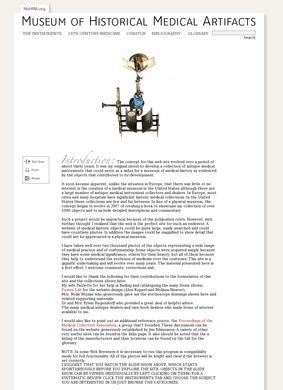MoHMA, also known as the Museum of the History of Medical Artifacts, is an online resource that offers a comprehensive guide and view into the world of antique medical instruments. As a digital collection, it hosts a wide range of historical medical instruments arranged in categorized menus for easy navigation. These varying categories include Anatomy, Bleeding and Cupping, Leeches, Civil War Dental, Electricity, ENT Health Aids, History of Medicine Art, and Medical Diagnosis including tools used in Auscultation, Stethoscope usage, Blood Pressure testing devices, and Cardiology and Hematology tools, among others.
In addition, the museum showcases a variety of devices used for infection detection and treatment, such as Microscopes. It also displays miscellaneous diagnostic tools, instruments used in Nephrology and Neurology, plus Thermometers. For those interested in the pharmaceutical aspect of medical history, MoHMA features a range of old Medicine Bottles, Obstetrics and Gynecology tools, Ophthalmology tools, and items from ancient Pharmacies and Medicine Chests. Other tools exhibited pertain to Pulmonary studies, Quackery Cures, Patent Medicines, Phrenology, Radiation devices, Radiology equipment, and various surgical instruments. The surgical tool collection includes devices used in Anesthesia, General Surgery, Cased Set Saw Therapy, and Gastro Intestinal General Medicine.
Interestingly, this online platform's concept evolved over a period of about thirty years. Its initial objective was to serve as a base for a physical museum of medical history in the United States. However, due to the lack of interest in establishing such an institution, MoHMA decided to take the digital route. This decision was influenced by the fact that medical museums are not as prominent or common in the United States as they are in Europe, despite the availability of antique medical instrument collectors and dealers.
More so, MoHMA does not neglect the narrative and educational side, offering resources such as the Medical Collectors Association, Curator Bibliography, and a Glossary for terms used on their site. It effectively encapsulates the essence of medical history, even as it pertains to 19th Century Medicine, Urology, and Vaccination.
In conclusion, MoHMA provides a valuable resource for those interested in the history of medicine, particularly those who focus on the evolution of medical tools and Equipment. It makes a substantial contribution to the sharing and preservation of medical history in digital form.
